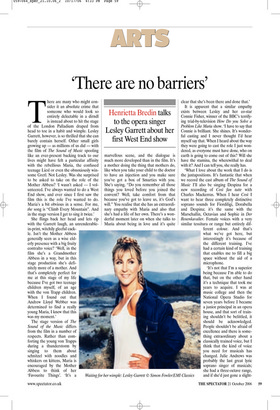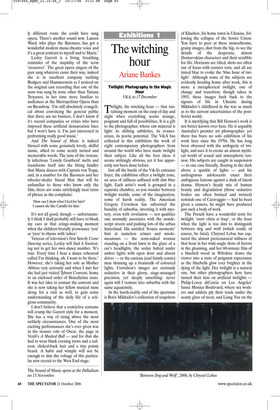‘There are no barriers’
There are many who might consider it an absolute crime that someone who would look so entirely delectable in a dirndl is instead about to hit the stage of the London Palladium draped from head to toe in a habit and wimple. Lesley Garrett, however, is so thrilled that she can barely contain herself. Other small girls growing up — as millions of us did — with the film of The Sound of Music spooling like an ever-present backing track to our lives might have felt a particular affinity with the rebellious Maria, the confused teenage Liesl or even the obnoxiously winsome Gretl. Not Lesley. Was she surprised to be asked to take on the role of the Mother Abbess? ‘I wasn’t asked — I volunteered. I’ve always wanted to do a West End show, and ever since I first saw the film this is the role I’ve wanted to do. Maria’s a bit obvious in a sense. For me, the song is “Climb Every Mountain”. And in the stage version I get to sing it twice.’ She flings back her head and lets rip with the Garrett laugh, an unrenderablein-print, witchily gleeful cackle. Isn’t the Mother Abbess generally seen as a wise elderly presence with a big fruity contralto voice? ‘Well, in the film she’s a Grandmother Abbess in a way, but in this stage production she’s definitely more of a mother. And that’s completely perfect for me at this stage of my life because I’ve got two teenage children myself, of an age with the von Trapp children. When I found out that Andrew Lloyd Webber was determined to find a really young Maria, I knew that this was my moment.’ The stage version of The Sound of the Music differs from the film in a number of respects. Rather than comforting the young von Trapps during a thunderstorm by singing to them about schnitzel with noodles and whiskers on kittens, Maria is encouraged by the Mother Abbess to think of her ‘Favourite Things’. ‘It’s a marvellous scene, and the dialogue is much more developed than in the film. It’s a mother doing the thing that mothers do, like when you take your child to the doctor to have an injection and you make sure you’ve got a box of Smarties with you. She’s saying, “Do you remember all those things you loved before you joined the convent? Well, take comfort from that because you’ve got to leave us, it’s God’s will.” You realise that she has an extraordinary empathy with Maria and also that she’s had a life of her own. There’s a wonderful moment later on when she talks to Maria about being in love and it’s quite clear that she’s been there and done that.’ It is apparent that a similar empathy exists between Lesley and her co-star Connie Fisher, winner of the BBC’s terrifying trial-by-television How Do you Solve a Problem Like Maria show. ‘I have to say that Connie is brilliant. She shines. It’s wonderful casting and I never thought I’d hear myself say that. When I heard about the way they were going to cast the role I just wondered, as everyone must have done, who on earth is going to come out of this? Will she have the stamina, the wherewithal to deal with it? And I can tell you, she really has.
‘What I love about the work that I do is the juxtapositions. It’s fantastic that when we record the cast album of The Sound of Music I’ll also be singing Despina for a new recording of Cos! fan tutte with Charles Mackerras. When I hear Cos! I want to hear three completely distinctive soprano sounds for Fiordiligi, Dorabella and Despina; it’s the same with the Marschallin, Octavian and Sophie in Der Rosenkavalier. Female voices with a very similar tessitura or range but entirely different colour. And that’s what we’ve got here, but interestingly it’s because of the different training. I’ve had a certain kind of training that enables me to fill a big space without the aid of a microphone.
‘It’s not that I’m a superior being because I’m able to do that, but on the other hand it’s a technique that took me years to acquire. I was at music college and then the National Opera Studio for seven years before I became a junior principal in an opera house, and that sort of training shouldn’t be belittled, it should be acknowledged. People shouldn’t be afraid of excellence and there is something extraordinary about a classically trained voice, but I think that the kind of voice you need for musicals has changed. Julie Andrews was probably the last great lyric soprano singer of musicals; she had a three-octave range, and if she’d just gone a slight ly different route she could have sung opera. There’s another sound now. Lauren Ward, who plays the Baroness, has got a wonderful modern music-theatre voice and it’s a great contrast to myself and to Maria.’ Lesley Garrett is a living, breathing reminder of the stupidity of the term ‘crossover’. The great opera singers of the past sang whatever came their way, indeed she is in excellent company tackling Rodgers and Hammerstein as I noticed on the original cast recording that one of the nuns was sung by none other than Tatiana Troyanos, in her time more familiar to audiences at the Metropolitan Opera than on Broadway. ‘I’m still absolutely evangelical about convincing the general public that there are no barriers. I don’t know if it’s record companies or critics who have imposed these artificial demarcation lines but I won’t have it. I’m just interested in performing really good music.’ And The Sound of Music is indeed blessed with some genuinely lovely, skilful music, allied to some neatly turned and memorable words. The tune of the riotously infectious ‘Lonely Goatherd’ melts and transforms itself into the lilting ländler that Maria dances with Captain von Trapp, and, in a number for the Baroness and her wheeler-dealer friend Max that will be unfamiliar to those who know only the film, there are some satisfyingly neat turns of phrase as she complains:
‘How can I show what I feel for him? I cannot die like Camille for him.’
It’s not all good, though — unfortunately I think I shall probably still have to block my ears at that cringe-making moment when the children brutally pronounce ‘you’ as ‘yieu’ to rhyme with ‘adieu’.
Veteran of television’s first Strictly Come Dancing series, Lesley will find it frustrating not to get her own dance number. ‘It’s true. Every time I hear a dance rehearsal called I’m thinking, oh, I want to be there.’ However, she’s taking her role as Mother Abbess very seriously and when I met her she had just visited Tyburn Convent, home to an enclosed order of Benedictine nuns. It was her idea to contact the convent and she is now taking her fellow musical nuns along for a visit as well, to gain some understanding of the daily life of a religious community.
I don’t believe that a restrictive costume will cramp the Garrett style for a moment. She has a way of rising above the most unlikely circumstances. One of the most exciting performances she’s ever given was in the trouser role of Oscar, the page in Verdi’s A Masked Ball — and for that she had to wear black evening trews and a tailcoat, slicked-back hair and a tiny pointy beard. A habit and wimple will not be enough to dim the voltage of this particular new recruit to the West End stage.



































































































 Previous page
Previous page